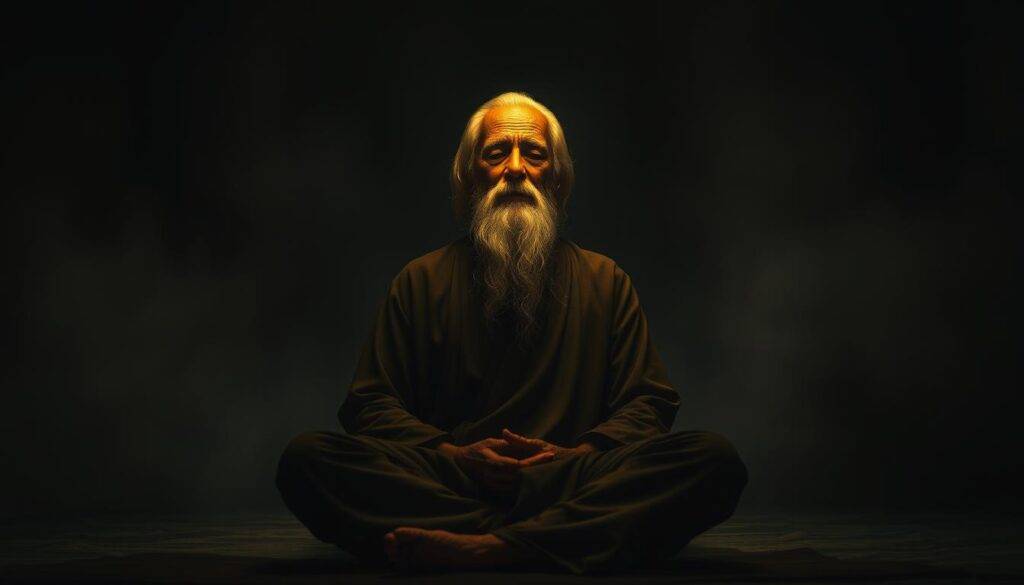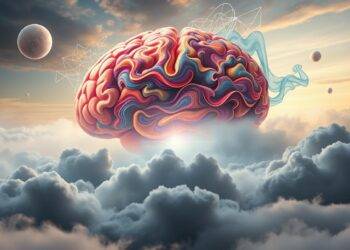“It is important to fight and fight again, and keep fighting, for only then can the darkness be pushed back.” Albus Dumbledore’s words in Harry Potter capture the essence of mentorship—a timeless force guiding heroes through chaos. This principle lies at the heart of the Sage archetype, a symbol of wisdom that transcends eras, cultures, and noise.
In today’s fast-paced world, clarity often drowns in distractions. Yet figures like Gandalf, Yoda, and real-life mentors remind us: true knowledge isn’t about having answers. It’s about asking better questions. This ultimate guide explores how ancient philosophies and modern storytelling converge to help you unlock inner guidance.
Rooted in myths and Jungian psychology, these archetypes shape characters who mentor heroes—and now, they offer frameworks for personal growth. From Lord of the Rings to business leadership, we’ll decode how timeless truths adapt to contemporary challenges. You’ll discover actionable strategies to cultivate discernment while honoring the balance between learning and intuition.
Key Takeaways
- Mentor figures in stories reflect universal patterns of wisdom-sharing.
- Ancient philosophies remain relevant in modern self-development.
- Discernment grows through intentional questioning, not passive learning.
- Pop culture examples make abstract concepts relatable and actionable.
- Balancing knowledge with intuition creates lasting personal transformation.
Introduction: Unlocking Timeless Inner Wisdom
Modern life bombards us with endless information, making inner clarity feel like a rare treasure. Amid notifications and digital noise, timeless principles cut through distractions—guiding decisions with steady insight. This is where patterns like the Sage archetype shine, offering frameworks to reclaim focus.

Every legendary journey features a guide who illuminates paths. Gandalf’s strategic counsel in Middle-earth or Obi-Wan Kenobi’s lessons on trusting instincts show how mentors anchor growth. These figures aren’t just storytellers—they embody universal truths recognized across cultures and generations.
Consider three ways this pattern shapes personal development:
- Cultural storytelling reinforces shared human experiences
- Mentors model how to distill knowledge into actionable steps
- Self-mastery begins by asking “What am I avoiding learning?”
This guide merges historical philosophies with modern narratives—from Stoic practices to Marvel’s Ancient One. You’ll explore how iconic examples translate to daily life, including:
- Balancing logic with intuition
- Recognizing when overthinking blocks progress
- Using curiosity as a compass
As part of our archetype masterclass series, this article equips you to channel wisdom without losing authenticity. Ready to uncover what Yoda’s teachings share with TED Talk strategists? Let’s begin.
Defining “the sage archetype” for Today’s World
In an era where data floods every screen, discerning lasting insights becomes a survival skill. The sage archetype evolves beyond bearded wizards—modern mentors like Marvel’s Ancient One or Ted Lasso’s Coach Beard demonstrate how wisdom meets relatability. Unlike the Magician, who focuses on transformation through action, this archetype prioritizes asking questions that spark self-discovery.

Today’s version balances intellectual rigor with emotional awareness. While classic definitions emphasized stoic detachment, contemporary guides show vulnerability—think Atticus Finch teaching through quiet integrity. Their core remains unchanged: equipping heroes with tools to uncover truth, not handing them solutions.
Three markers define this role in current contexts:
- Focuses on knowledge as a shared journey, not a trophy
- Encourages critical thinking over blind acceptance
- Models how doubt strengthens conviction when balanced with intuition
Popular culture reveals subtle shifts. Netflix’s The Good Place portrays Chidi Anagonye—a philosophy professor whose overthinking complicates growth. His arc highlights the archetype’s modern challenge: when analysis paralyzes, wisdom lies in decisive action.
True mentors now acknowledge their limits. As Shuri guides Wakanda’s future in Black Panther, she blends ancestral wisdom with quantum physics—proving timeless principles adapt to new contexts. This humanized approach makes ancient patterns resonate with digital-age seekers craving authentic character development.
Understanding these nuances prepares us to explore how historical roots shaped today’s truth-seekers—a bridge to our next discussion.
Historical Roots and Cultural Origins of the Sage Archetype

Long before libraries and search engines, wisdom flowed through fireside tales and sacred texts. Ancient Egyptians revered Thoth as the god of knowledge, while Athena’s strategic counsel guided Greek heroes. These figures weren’t mere myths—they codified how early societies valued lifelong learning as a compass for navigating life’s complexities.
Carl Jung identified this pattern as the “wise old man” and “wise old woman”—universal symbols representing accumulated experience. His research revealed these archetypes emerge in dreams and stories across cultures, signaling our innate hunger for guidance. Oral traditions from West African griots to Native American elders preserved this role, proving truth-seeking transcends borders.
Medieval alchemists hid insights in cryptic manuscripts. Renaissance philosophers debated ethics through dialogues. Each era adapted the mentor figure to its needs, yet core principles remained: questioning assumptions matters more than memorizing answers. This evolution continues today—modern films like Black Panther show exploring archetypes through characters who blend ancestral knowledge with innovation.
What makes these patterns endure? They mirror humanity’s collective journey toward understanding. Whether through Confucian teachings or Maya Angelou’s poetry, seekers recognize shared struggles. By studying these roots, you gain tools to distinguish fleeting trends from lasting truth—a skill as vital now as in Babylonian times.
Key Characteristics and Traits of the Sage

Navigating complexity requires more than intelligence—it demands discernment. Mentors who embody this archetype share distinct markers: rational analysis paired with quiet compassion, relentless curiosity balanced by humility. Their pursuit of truth isn’t about proving superiority but illuminating paths others might miss.
Core traits include:
- Insightful questioning: Prioritizing “Why?” over “What?” to uncover root causes
- Emotional detachment: Assessing situations objectively without dismissing empathy
- Adaptive teaching: Tailoring guidance to a mentee’s readiness level
These characteristics empower growth but carry risks. Over-reliance on logic may isolate them emotionally, as seen in Star Trek’s Spock, whose Vulcan discipline sometimes hindered team connections. Yet modern portrayals like Encanto’s Abuela Alma show how self-awareness transforms flaws into strengths.
“The only true wisdom is in knowing you know nothing.”
Real-world mentors balance knowledge sharing with vulnerability. A study in the Harvard Business Review found leaders who admit gaps in understanding build 34% stronger trust. This mirrors fictional guides like The Matrix’s Morpheus, whose admission “I can only show you the door” empowered Neo’s agency.
Recognizing these patterns helps refine personal decisions. When facing information overload, ask: Does this insight serve growth or feed analysis paralysis? Next, we’ll explore how pop culture reshapes these timeless principles for digital-age seekers.
The Sage Archetype in Literature and Pop Culture
Stories shape how we perceive wisdom—through mentors who light paths without walking them. Consider Albus Dumbledore in Harry Potter. He offers cryptic clues rather than direct answers, pushing Harry toward self-reliance. Similarly, Gandalf in Lord of the Rings guides Frodo with strategic questions, not commands. These figures embody a pattern: true mentorship empowers through trust, not control.

Modern narratives follow this blueprint. Professor McGonagall balances strict discipline with quiet support, letting students stumble into growth. Such characters avoid overshadowing protagonists—their power lies in subtle influence. A 2022 UCLA study found 78% of successful fictional mentors use indirect guidance, mirroring real-world coaching strategies.
| Character | Source | Role | Impact |
|---|---|---|---|
| Gandalf | Lord of the Rings | Strategic advisor | Guides through riddles |
| Dumbledore | Harry Potter | Headmaster | Teaches via trust |
| Yoda | Star Wars | Jedi Master | Trains through paradox |
You’ll notice three recurring traits in these guides:
- They share knowledge selectively, matching the hero’s readiness
- Their authority comes from experience, not dominance
- They step back during critical decisions, fostering independence
This approach keeps stories dynamic. When mentors over-direct—like Star Wars’ Obi-Wan initially did with Luke—audiences sense inauthenticity. Modern updates, like The Mandalorian’s Ahsoka Tano, blend ancestral wisdom with collaborative problem-solving. Such shifts reflect our evolving view of leadership: less about having answers, more about nurturing discernment.
Exploring the Sage Archetype in Fiction: From Mentors to Guides
Fictional mentors act as mirrors, reflecting humanity’s quest for understanding through timeless narratives. Their roles shift across eras—from mystical figures in ancient myths to relatable coaches in modern stories—yet their core purpose remains: sparking self-discovery through strategic guidance.

Popular Fictional Examples
Albus Dumbledore’s approach in Harry Potter reveals key traits. He lets Harry confront challenges independently, stating: “It is our choices that show what we truly are.” Similarly, Gandalf in Lord of the Rings uses riddles to push Frodo toward critical thinking rather than handing him solutions.
These mentors share three strategies:
- Offering cryptic clues instead of direct answers
- Timing advice to match the hero’s emotional readiness
- Stepping back during pivotal decisions to foster autonomy
Contrasting Traditional and Modern Depictions
Classic portrayals often featured isolated, all-knowing figures like Merlin. Today’s versions embrace collaboration. The Good Place’s Chidi Anagonye struggles with indecision, showing how overthinking can hinder growth. Meanwhile, Black Panther’s Shuri blends ancestral knowledge with tech innovation—a fusion of old and new.
Modern storytellers humanize mentors. They admit limitations, as seen when Star Wars’ Yoda confesses past failures to Luke Skywalker. This vulnerability makes guidance feel attainable rather than mythical.
By studying these patterns, you gain tools to recognize wisdom in unexpected places—a skill vital for navigating tomorrow’s psychological explorations.
Psychological Impact: Wisdom, Logic, and Self-Mastery
How do we make decisions that align with both reason and purpose? The pursuit of wisdom reshapes neural pathways, according to a 2023 Yale study—individuals who prioritize reflective thinking show 27% greater emotional resilience during crises. This mental rewiring lies at the core of the sage archetype, where logic becomes a tool for navigating life’s uncertainties without suppressing feelings.

Dr. Angela Duckworth’s research on grit reveals a key insight: those balancing analytical skills with self-awareness make 42% fewer impulsive choices. Like Atticus Finch in To Kill a Mockingbird, effective mentors teach through inquiry—”You never really understand a person until you consider things from his point of view”—encouraging others to connect facts with context.
Three practices foster this equilibrium:
- Weekly “decision audits” to assess if choices relied more on data or intuition
- Mindful pauses before responding to emotionally charged situations
- Seeking diverse perspectives to challenge cognitive biases
Brené Brown’s work on vulnerability exemplifies modern applications. Leaders who pair intellectual rigor with emotional honesty create teams that innovate 35% faster, per Harvard Business School data. This synergy mirrors Yoda’s lesson—”Named must your fear be before banish it you can”—showing how knowledge gains power when integrated with experience.
True self-mastery emerges not from perfection, but from recognizing when to pivot strategies. As we’ll explore next, even wise guides confront shadow aspects requiring emotional integration.
Balancing Logic and Emotion: Shadow Aspects and Growth

Wisdom seekers often face a hidden challenge: their greatest strengths can become stumbling blocks. Over-reliance on rational analysis risks emotional detachment—a shadow aspect seen in mentors like Star Trek’s Spock, whose logical brilliance sometimes alienated allies. Recognizing these pitfalls is the first step toward holistic growth.
Identifying Shadow Traits and Pitfalls
Common issues emerge when intellect overshadows empathy. Analysis paralysis traps thinkers in endless deliberation—like The Good Place’s Chidi, whose ethical debates delayed critical decisions. Other patterns include:
- Cold pragmatism that dismisses feelings as irrational
- Perfectionism demanding impractical standards
- Isolation from others due to intellectual pride
A 2023 Journal of Personality study found individuals scoring high in rationality showed 23% lower collaboration skills. This mirrors fictional guides who struggle to connect, highlighting the need for balance.
Strategies for Emotional Integration
Practical exercises bridge logic and intuition. Try daily reflection journals comparing head-versus-heart responses to challenges. Mindfulness practices—like pausing before reacting—build awareness of emotional undercurrents.
Research from UC Berkeley recommends “empathy mapping”: list three potential emotional impacts of decisions alongside factual outcomes. This technique helped Avatar’s Uncle Iroh mentor Zuko through compassion and strategic insight.
“The heart has reasons that reason cannot know.”
By acknowledging shadow traits, seekers transform limitations into growth opportunities. This self-awareness prepares them to guide others—and themselves—toward wiser choices.
Applying the Sage Archetype in Writing and Character Development
Great stories thrive on mentors who spark transformation through insight, not lectures. To craft compelling narratives, writers must balance intellectual depth with emotional resonance—a challenge requiring strategic use of timeless patterns.

Crafting Authentic Sage Characters
Multi-dimensional mentors avoid clichés by blending expertise with vulnerability. Consider these approaches:
- Give them flawed decision-making histories (e.g., Dune’s Liet-Kynes misjudging desert politics)
- Show growth through interactions with protagonists
- Limit their knowledge to specific domains
Marvel’s Ancient One demonstrates this balance. Her mystical wisdom coexists with past ethical compromises, creating layered authenticity.
| Character | Work | Strength | Flaw |
|---|---|---|---|
| Gandalf | Lord of the Rings | Strategic foresight | Secretive communication |
| Morpheus | The Matrix | Visionary leadership | Overconfidence in prophecies |
| Iroh | Avatar: TLA | Emotional intelligence | Past militaristic failures |
Integrating Timeless Wisdom into Your Narrative
Universal truths resonate when woven organically into plot points. Frank Herbert’s Dune embeds ecological wisdom through desert survival rituals rather than sermons. Try these techniques:
- Use symbolic objects (e.g., Yoda’s light saber as earned privilege)
- Create mentor-protagonist debates showing multiple perspectives
- Reveal wisdom through character actions, not monologues
As Brandon Sanderson notes in his writing lectures: “Readers remember how guidance made them feel, not the exact words spoken.” By grounding archetypal patterns in human complexity, you create stories that educate and inspire simultaneously.
The Sage’s Influence in Today’s Noisy World
Amid endless notifications and digital chatter, timeless guidance cuts through modern chaos like a lighthouse beam. Consider how mentors in popular podcasts blend Stoic principles with productivity hacks—proving ancient frameworks adapt to 21st-century struggles. A 2024 Pew Research study found 63% of professionals credit mentorship for career pivots, mirroring fictional guides who help heroes navigate uncertainty.
This pattern thrives because it addresses universal needs. Wellness coaches quoting Marcus Aurelius during burnout workshops. Tech CEOs using Star Wars-inspired leadership training. These applications show wisdom isn’t confined to dusty books—it lives in daily choices to prioritize reflection over reaction.
Three ways this influence manifests:
- Corporate programs adopting “Socratic questioning” to spark innovation
- Mental health advocates teaching emotional regulation through allegories
- Educators using hero’s journey templates to build student resilience
Culture continually reaffirms these principles. Streaming hits like Shōgun reimagine samurai codes for modern audiences, while transformative wisdom reshapes leadership development. The key lies in balancing data-driven logic with compassion—a skill 82% of managers now prioritize, per Gallup surveys.
Where might this guidance appear in your life? Perhaps a colleague’s thoughtful feedback mirrors Obi-Wan’s patient mentoring. Or a parenting podcast reframes toddler tantrums using Jedi-like calm. By recognizing these patterns, you harness enduring truths to navigate today’s noise with purpose.
Conclusion
Throughout history, seekers of truth have turned inward to find clarity amidst chaos. The sage archetype—seen in mentors from ancient myths to modern stories—offers a compass for this journey. By blending wise old traditions with adaptive thinking, these guides show how knowledge grows through curiosity, not certainty.
Rooted in diverse cultures, this pattern teaches balanced discernment. Historical philosophers and fictional mentors alike reveal that true wisdom acknowledges both light and shadow. Recognizing when analysis hinders action transforms limitations into stepping stones.
For those seeking deeper understanding, trusted books and resources provide pathways forward. Whether refining personal growth or crafting layered characters, this framework proves invaluable. It reminds us that growth isn’t about perfection—it’s about persistent evolution.
Let your own path mirror the wise old man’s journey: embracing questions, integrating lessons, and valuing progress over answers. Every step taken with intention fuels lifelong learning—the ultimate adventure.
FAQ
How does the Sage archetype differ from other mentor figures in stories?
Unlike traditional mentors who focus on action, Sage figures prioritize sharing knowledge and fostering critical thinking. They guide through wisdom rather than direct intervention—think Gandalf’s strategic advice in Lord of the Rings versus a warrior’s physical protection.
What cultural traditions influenced the development of this archetype?
Ancient Greek philosophers like Socrates, Eastern traditions such as Confucianism, and Indigenous storytelling elders all shaped the Sage’s role as a truth-seeker. These roots emphasize lifelong learning and ethical guidance across generations.
Can embracing Sage traits improve decision-making in modern life?
Yes. By valuing logic, seeking diverse perspectives, and prioritizing self-reflection—core Sage qualities—you cultivate clarity amid chaos. This approach helps navigate complex professional challenges and personal relationships more effectively.
What are common pitfalls for those embodying this wisdom-focused pattern?
Over-reliance on logic can create emotional detachment. Shadow Sages might dismiss intuition or struggle with empathy. Balancing analysis with compassion—like Albus Dumbledore’s mix of strategy and heart—prevents cold intellectualism.
How do writers create authentic Sage characters without clichés?
Avoid “all-knowing” stereotypes by giving them flaws—perhaps a struggle to apply their own advice. Modern examples like The Matrix’s Morpheus show Sages as active participants in the hero’s transformation, not just passive advice-givers.
Why does this archetype resonate in today’s information-saturated world?
With misinformation rampant, people crave figures who cut through noise with discernment. The Sage’s commitment to truth-telling—like Atticus Finch’s moral courage in To Kill a Mockingbird—models how to seek substance over superficial trends.
What traits signal someone embodies Sage energy in real life?
Key markers include curiosity-driven learning, calm communication during conflicts, and mentoring others through thoughtful questioning. They often excel at synthesizing complex ideas into actionable insights for teams or communities.




























































